Participant Biographies
Anima Adjepong, Simmons College
FRIDAY at 3: "Unexpected Queerings – Expanding Definitions for Contemporary Black African Masculinities"
 Anima Adjepong is an assistant professor of sociology at Simmons College interested in questions of culture, identity, and black/African diaspora. Adjepong received their Ph.D. from the University of Texas at Austin. Their research examines the iterative relationship between cultural practices and ideologies of race and ethnicity, gender, class, and sexuality. Adjepong has pursued these questions by studying sports (specifically rugby and football/soccer) and black immigrant communities. Adjepong’s published work can be found in edited books and journals including Ethnic and Racial Studies and Sport in Society.
Anima Adjepong is an assistant professor of sociology at Simmons College interested in questions of culture, identity, and black/African diaspora. Adjepong received their Ph.D. from the University of Texas at Austin. Their research examines the iterative relationship between cultural practices and ideologies of race and ethnicity, gender, class, and sexuality. Adjepong has pursued these questions by studying sports (specifically rugby and football/soccer) and black immigrant communities. Adjepong’s published work can be found in edited books and journals including Ethnic and Racial Studies and Sport in Society.
Paulina Alberto, University of Michigan
SATURDAY at 10:45: Roundtable Discussant
 Paulina L. Alberto (Ph.D. University of Pennsylvania, 2005) is associate professor in the Departments of History and of Romance Languages and Literatures (Programs in Spanish and Portuguese) at the University of Michigan. She is the author of multiple articles on racial activism and racial ideologies in modern Brazil and Argentina, and of “Terms of Inclusion: Black Intellectuals in Twentieth-Century Brazil” (UNC Press, 2011), awarded the Roberto Reis Prize for Best Book in Brazilian Studies (BRASA, 2012) and the Warren Dean Prize for Best Book in Brazilian History (CLAH, 2013). She is co-editor (with Eduardo Elena) of “Rethinking Race in Modern Argentina” (Cambridge University Press, 2016). Her current book manuscript, “Black Legend: The Unexpected Story of “El Negro Raúl” and the Untold History of Race in Argentina,” explores the power of racial stories to construct “whiteness” and “blackness” in 20th-century Argentina and to shape individual fates.
Paulina L. Alberto (Ph.D. University of Pennsylvania, 2005) is associate professor in the Departments of History and of Romance Languages and Literatures (Programs in Spanish and Portuguese) at the University of Michigan. She is the author of multiple articles on racial activism and racial ideologies in modern Brazil and Argentina, and of “Terms of Inclusion: Black Intellectuals in Twentieth-Century Brazil” (UNC Press, 2011), awarded the Roberto Reis Prize for Best Book in Brazilian Studies (BRASA, 2012) and the Warren Dean Prize for Best Book in Brazilian History (CLAH, 2013). She is co-editor (with Eduardo Elena) of “Rethinking Race in Modern Argentina” (Cambridge University Press, 2016). Her current book manuscript, “Black Legend: The Unexpected Story of “El Negro Raúl” and the Untold History of Race in Argentina,” explores the power of racial stories to construct “whiteness” and “blackness” in 20th-century Argentina and to shape individual fates.
Richard Bell, University of Maryland
FRIDAY at 9:30: “Counterfeit Kin: Kidnappers of Color, the Reverse Underground Railroad, and the Origins of Practical Abolition”
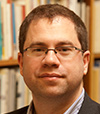 Richard Bell is associate professor of history at the University of Maryland. He received his Ph.D. from Harvard University and his B.A. from the University of Cambridge. His research interests focus on American history between 1750 and 1877. He has published two books. The first, a monograph titled “We Shall Be No More: Suicide and Self-Government in the Newly United States,” examines the role that discourse regarding self-destruction played in the cultural formation of the early republic. The second work, “Buried Lives: Incarcerated in Early America,” a co-edited volume of essays centered on the experience of incarcerated subjects and citizens in early America, is the product of a conference organized at the McNeil Center in 2009. Bell is currently at work upon a new book-length micro-history—“The Lost Boys: A Story of Slavery and Justice on the Reverse Underground Railroad”— which is under contract with Simon & Schuster. He is also the author of several journal articles, most recently in the Journal of the Early Republic, Early American Literature, Slavery and Abolition, and History Compass. He has held research fellowships at 20 libraries and institutes and is the recipient of more than a dozen teaching awards, including the 2017 University System of Maryland Board of Regents Faculty Award for Excellence in Teaching, the highest honor for teaching faculty in the Maryland state system.
Richard Bell is associate professor of history at the University of Maryland. He received his Ph.D. from Harvard University and his B.A. from the University of Cambridge. His research interests focus on American history between 1750 and 1877. He has published two books. The first, a monograph titled “We Shall Be No More: Suicide and Self-Government in the Newly United States,” examines the role that discourse regarding self-destruction played in the cultural formation of the early republic. The second work, “Buried Lives: Incarcerated in Early America,” a co-edited volume of essays centered on the experience of incarcerated subjects and citizens in early America, is the product of a conference organized at the McNeil Center in 2009. Bell is currently at work upon a new book-length micro-history—“The Lost Boys: A Story of Slavery and Justice on the Reverse Underground Railroad”— which is under contract with Simon & Schuster. He is also the author of several journal articles, most recently in the Journal of the Early Republic, Early American Literature, Slavery and Abolition, and History Compass. He has held research fellowships at 20 libraries and institutes and is the recipient of more than a dozen teaching awards, including the 2017 University System of Maryland Board of Regents Faculty Award for Excellence in Teaching, the highest honor for teaching faculty in the Maryland state system.
Jody Benjamin, University of California, Riverside
FRIDAY at 11: “Textiles, Clothing and Cultural Encounters: Self-Fashioning on the Upper Guinea Coast, 1820-1850"
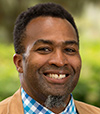 Jody Benjamin is assistant professor of history at the University of California, Riverside. He received his Ph.D. from Harvard University in the Department of African and African American Studies in 2016. His book manuscript, “The Texture of Change: Cloth, Commerce, and History in West Africa, 1700-1850,” focuses on the production, commerce and consumption of cloth and clothing as a window to understanding social and economic change in the region between Senegal and Guinea (Conakry). This research illuminates African peoples’ varied engagements with the global economy in the early modern period. It considers the significance of a regional African indigo cloth economy to wider commercial exchanges, that of India as a source of textiles desired by African merchants, and that of the Indian Ocean generally to West African and Atlantic networks. Before Harvard, he earned an M.F.A. in nonfiction writing from Columbia University and a B.A. in black studies and French from Oberlin College.
Jody Benjamin is assistant professor of history at the University of California, Riverside. He received his Ph.D. from Harvard University in the Department of African and African American Studies in 2016. His book manuscript, “The Texture of Change: Cloth, Commerce, and History in West Africa, 1700-1850,” focuses on the production, commerce and consumption of cloth and clothing as a window to understanding social and economic change in the region between Senegal and Guinea (Conakry). This research illuminates African peoples’ varied engagements with the global economy in the early modern period. It considers the significance of a regional African indigo cloth economy to wider commercial exchanges, that of India as a source of textiles desired by African merchants, and that of the Indian Ocean generally to West African and Atlantic networks. Before Harvard, he earned an M.F.A. in nonfiction writing from Columbia University and a B.A. in black studies and French from Oberlin College.
Amoako Boafo, Independent Artist
FRIDAY at 3 (with Anima Adjepong): “Unexpected Queerings – Expanding Definitions for Contemporary Black African Masculinities”
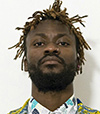 Amoako Boafo is a Ghanaian-born Vienna-based artist currently studying for his M.A. in painting at the University of Fine Arts, Vienna, Austria. Combining oil, acrylic, and pastel he incorporates elements from his daily life onto his canvases, touching topics of social and political struggles. Boafo is part of the project “WE DEY.IN,” which is an artist collective aiming to support the struggle of international artists for recognition and to challenge labels which are often used to justify exclusion from the main contemporary art scene.
Amoako Boafo is a Ghanaian-born Vienna-based artist currently studying for his M.A. in painting at the University of Fine Arts, Vienna, Austria. Combining oil, acrylic, and pastel he incorporates elements from his daily life onto his canvases, touching topics of social and political struggles. Boafo is part of the project “WE DEY.IN,” which is an artist collective aiming to support the struggle of international artists for recognition and to challenge labels which are often used to justify exclusion from the main contemporary art scene.
Jarrett Hugh Brown, Howard University
FRIDAY at 3: “Negotiating the 'Dominant Urge' of an Impossible Masculinity: Insights into Claude McKay’s Man”
 Jarrett H. Brown is currently an assistant professor in English at Howard University where he teaches courses on Anglophone Caribbean literature and culture. In his current book project he explores representations and iterations of black masculinities in Claude McKay's works of fiction and correspondences by using marronage as a trope to frame the theoretical conclusions of the texts. The book is entitled, "Maroon Masculinities and the Truants, Vagabonds, and Transients in Metropolitan Spaces." He has also published in the journals, Caribbean Quarterly, the Journal of West Indian Literature and also in two edited collections. He earned his B.A. at the University of the West Indies in Jamaica, his M.A. at Clark University and his Ph.D. at the College of William and Mary.
Jarrett H. Brown is currently an assistant professor in English at Howard University where he teaches courses on Anglophone Caribbean literature and culture. In his current book project he explores representations and iterations of black masculinities in Claude McKay's works of fiction and correspondences by using marronage as a trope to frame the theoretical conclusions of the texts. The book is entitled, "Maroon Masculinities and the Truants, Vagabonds, and Transients in Metropolitan Spaces." He has also published in the journals, Caribbean Quarterly, the Journal of West Indian Literature and also in two edited collections. He earned his B.A. at the University of the West Indies in Jamaica, his M.A. at Clark University and his Ph.D. at the College of William and Mary.
Michael A. Bucknor, University of the West Indies
FRIDAY at 1:30: “Black Dandy in Afro-Caribbean Diasporas: Black Aesthetics as an Epistemology of Improvisation, Self-Invention and Re-humanization”
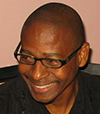 Michael A. Bucknor is a senior lecturer/associate professor, head of the Department of Literatures in English and the public orator of the Mona Campus, University of the West Indies. He is a senior editor of Journal of West Indian Literature, a senior editorial advisor of Lucayos and sits on the editorial advisory boards of Caribbean Quarterly and Issues in Critical Investigation. He is also co-editor with Alison Donnell of The Routledge Companion to Anglophone Caribbean Literature, carries out research on Austin Clarke, Caribbean-Canadian writing, postcolonial literatures and theory, diaspora studies, masculinities and popular culture. He is completing a book manuscript entitled, "Performing Masculinities in Jamaican Popular Culture."
Michael A. Bucknor is a senior lecturer/associate professor, head of the Department of Literatures in English and the public orator of the Mona Campus, University of the West Indies. He is a senior editor of Journal of West Indian Literature, a senior editorial advisor of Lucayos and sits on the editorial advisory boards of Caribbean Quarterly and Issues in Critical Investigation. He is also co-editor with Alison Donnell of The Routledge Companion to Anglophone Caribbean Literature, carries out research on Austin Clarke, Caribbean-Canadian writing, postcolonial literatures and theory, diaspora studies, masculinities and popular culture. He is completing a book manuscript entitled, "Performing Masculinities in Jamaican Popular Culture."
Antonia Carcelén-Estrada, College of the Holy Cross
FRIDAY at 9:30: “Homoerotic Desire and the Fallacy of Spanish Masculinity in Quito”
 Antonia Carcelén-Estrada is a visiting lecturer in Latin American and Latino Studies at the College of the Holy Cross. Her research interests include transatlantic early modern literature and historiography, translation studies, political philosophy, cultural studies, and oral literature. She works as a translator and interpreter for the local Latino community and is an activist for the revitalization of indigenous languages in the Andes, serves as chair of NECLAS Best Translation Committee, and have collaborated with Runapacha in Imbabura, Ecuador, and with the Migrants’ National Bureau of Ecuador (SENAMI) in Barcelona, Spain, developing cultural projects to organize locally for a global resistance. She teaches courses on early modern transatlantic literature with a focus on gender and on relational ontologies (how certain groups of people relate to others according to their place in the design of modernity), as well as courses on translation, cultural studies, and creative courses to apply writing to digital platforms in the target language (such as Sports Journalism and US Latinx Composition in Spanish).
Antonia Carcelén-Estrada is a visiting lecturer in Latin American and Latino Studies at the College of the Holy Cross. Her research interests include transatlantic early modern literature and historiography, translation studies, political philosophy, cultural studies, and oral literature. She works as a translator and interpreter for the local Latino community and is an activist for the revitalization of indigenous languages in the Andes, serves as chair of NECLAS Best Translation Committee, and have collaborated with Runapacha in Imbabura, Ecuador, and with the Migrants’ National Bureau of Ecuador (SENAMI) in Barcelona, Spain, developing cultural projects to organize locally for a global resistance. She teaches courses on early modern transatlantic literature with a focus on gender and on relational ontologies (how certain groups of people relate to others according to their place in the design of modernity), as well as courses on translation, cultural studies, and creative courses to apply writing to digital platforms in the target language (such as Sports Journalism and US Latinx Composition in Spanish).
Elizabeth Fretwell, University of Chicago
SATURDAY at 9: “Tailored Men: Technology, Mobility, and 'Dressing Literate' in Dahomey, 1950s-1970s”
 Elizabeth Ann Fretwell is a Ph.D. candidate in African history at the University of Chicago and a Dissertation Fellow at UChicago's Center for the Study of Gender and Sexuality. Her project, "Tailoring Benin: Gender, Material Culture, and Artisan Production in Urban West Africa," explores how ordinary men and women experienced and negotiated modernity, urbanization, and political transformation through a history of the objects, craft knowledge, and practices of tailoring. In this part of West Africa, men and women regularly buy cloth in local markets and bring it to tailors and seamstresses to sew into outfits for special occasions and everyday wear. In her dissertation, Fretwell argues that tailors and seamstresses should be considered at the forefront of the making of selves, cities, and nation in late colonial and postcolonial Africa. As she demonstrates, the work of tailoring was more than a cultural curiosity or the minutia of everyday life; it was a primary mediator of economic, social, and political change for ordinary Beninois.
Elizabeth Ann Fretwell is a Ph.D. candidate in African history at the University of Chicago and a Dissertation Fellow at UChicago's Center for the Study of Gender and Sexuality. Her project, "Tailoring Benin: Gender, Material Culture, and Artisan Production in Urban West Africa," explores how ordinary men and women experienced and negotiated modernity, urbanization, and political transformation through a history of the objects, craft knowledge, and practices of tailoring. In this part of West Africa, men and women regularly buy cloth in local markets and bring it to tailors and seamstresses to sew into outfits for special occasions and everyday wear. In her dissertation, Fretwell argues that tailors and seamstresses should be considered at the forefront of the making of selves, cities, and nation in late colonial and postcolonial Africa. As she demonstrates, the work of tailoring was more than a cultural curiosity or the minutia of everyday life; it was a primary mediator of economic, social, and political change for ordinary Beninois.
Dawn Fulton, Smith College
FRIDAY at 11: “Urban Iconography: Lauren Ekué and Afro-Parisian Consumerism”
 Dawn Fulton is professor of French studies at Smith College, where she also teaches in the comparative literature and film studies programs. Her publications include a book on Guadeloupean writer Maryse Condé (“Signs of Dissent: Maryse Condé and Postcolonial Criticism,” 2008) and articles on the works of such authors as Calixthe Beyala, Alain Mabanckou, Gisèle Pineau, and Mounsi. Her paper on Lauren Ekué is part of a project on gender and urbanism in Francophone narratives of migration.
Dawn Fulton is professor of French studies at Smith College, where she also teaches in the comparative literature and film studies programs. Her publications include a book on Guadeloupean writer Maryse Condé (“Signs of Dissent: Maryse Condé and Postcolonial Criticism,” 2008) and articles on the works of such authors as Calixthe Beyala, Alain Mabanckou, Gisèle Pineau, and Mounsi. Her paper on Lauren Ekué is part of a project on gender and urbanism in Francophone narratives of migration.
Véronique Hélénon, Independent Scholar
FRIDAY at 1:30: “The Afropolitan in France: A French-U.S. Conversation”
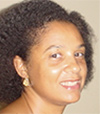 Véronique Hélénon is a historian whose area of expertise is the African Diaspora with a special emphasis on its French-speaking dimensions and the Caribbean. A Fulbright scholar, she taught at various institutions such as NYU, Columbia University, Florida International University and the University of Massachusetts-Boston. She has published articles and book chapters on the African diaspora, colonialism, and French hip-hop. She is the author of “French Caribbeans in Africa: Diasporic Connections and Colonial Administration, 1880-1939” (Palgrave, 2011).
Véronique Hélénon is a historian whose area of expertise is the African Diaspora with a special emphasis on its French-speaking dimensions and the Caribbean. A Fulbright scholar, she taught at various institutions such as NYU, Columbia University, Florida International University and the University of Massachusetts-Boston. She has published articles and book chapters on the African diaspora, colonialism, and French hip-hop. She is the author of “French Caribbeans in Africa: Diasporic Connections and Colonial Administration, 1880-1939” (Palgrave, 2011).
Sidra Lawrence, Bowling Green State University
SATURDAY at 9: “Afropolitan Detroit: Counterpublics, Sound, and the African City”
 Sidra Lawrence is an assistant professor of ethnomusicology at Bowling Green State University. She received a Ph.D. in ethnomusicology and a doctoral portfolio in women’s and gender studies from the University of Texas at Austin. Her research, based on ethnographic work in the border region of Ghana and Burkina Faso, explores the connections between racialized gender ideologies, musical performance, and the sexed body. In her book manuscript, “this animal called culture: Performing Feminism and the Politics of Everyday Solidarities,” Lawrence investigates ways in which women are regulated through the mobilization of cultural authenticity. She is also editing a volume on the connections between the erotic, ethnography, and sound, in “The Erotic Life of Sound and Movement: Recasting Ethnographic Experience in Africa and the Diaspora.” She is currently working on a project that connects African studies, critical geography and media studies in Ouagadougou. Her work has been supported by the Woodrow Wilson National Fellowship Foundation, the National Endowment for the Humanities, and the West African Research Association. She has publications in African Music, the Latin American Music Review, and Ethnomusicology.
Sidra Lawrence is an assistant professor of ethnomusicology at Bowling Green State University. She received a Ph.D. in ethnomusicology and a doctoral portfolio in women’s and gender studies from the University of Texas at Austin. Her research, based on ethnographic work in the border region of Ghana and Burkina Faso, explores the connections between racialized gender ideologies, musical performance, and the sexed body. In her book manuscript, “this animal called culture: Performing Feminism and the Politics of Everyday Solidarities,” Lawrence investigates ways in which women are regulated through the mobilization of cultural authenticity. She is also editing a volume on the connections between the erotic, ethnography, and sound, in “The Erotic Life of Sound and Movement: Recasting Ethnographic Experience in Africa and the Diaspora.” She is currently working on a project that connects African studies, critical geography and media studies in Ouagadougou. Her work has been supported by the Woodrow Wilson National Fellowship Foundation, the National Endowment for the Humanities, and the West African Research Association. She has publications in African Music, the Latin American Music Review, and Ethnomusicology.
Elizabeth Manley, Xavier University of Louisiana
FRIDAY at 3: “Female Sex Tourism and the Sanky-Panky: Deconstructing the Complex and Contradictory Masculinities of a Dominican Archetype”
 Elizabeth Manley is associate professor of history at Xavier University of Louisiana. She is the author of “The Paradox of Paternalism: Women and Authoritarian Politics in the Dominican Republic” (University Press of Florida, 2017) and co-author of “Cien Años de Feminismos Dominicanos” with Ginetta Candelario and April Mayes. She has published articles in The Americas and The Oxford Research Encyclopedia of Latin American Research and has pieces forthcoming in The Journal of Women’s History and Small Axe. She is a contributing editor for the Library of Congress’ Handbook of Latin American Studies and the co-chair of the Haiti-Dominican Republic section of the Latin American Studies Association.
Elizabeth Manley is associate professor of history at Xavier University of Louisiana. She is the author of “The Paradox of Paternalism: Women and Authoritarian Politics in the Dominican Republic” (University Press of Florida, 2017) and co-author of “Cien Años de Feminismos Dominicanos” with Ginetta Candelario and April Mayes. She has published articles in The Americas and The Oxford Research Encyclopedia of Latin American Research and has pieces forthcoming in The Journal of Women’s History and Small Axe. She is a contributing editor for the Library of Congress’ Handbook of Latin American Studies and the co-chair of the Haiti-Dominican Republic section of the Latin American Studies Association.
Trent Masiki, Dickinson College
SATURDAY at 9: “From Bohemian Piolo to Black Left Jorocón: The Pan-African Conversion Narrative in Carlos Moore’s Pinchón”
 Trent Masiki’s current book project, “The Afroethnic Impulse and Renewal,” focuses on African American literary, cultural, and political influences in contemporary Afro-Latino bildung memoirs. He examines how Afro-Latino writers use African American cultural tropes and narrative strategies to write themselves into the archive of U.S. citizenship, cultural history, and literary production.
Trent Masiki’s current book project, “The Afroethnic Impulse and Renewal,” focuses on African American literary, cultural, and political influences in contemporary Afro-Latino bildung memoirs. He examines how Afro-Latino writers use African American cultural tropes and narrative strategies to write themselves into the archive of U.S. citizenship, cultural history, and literary production.
Babacar M’Baye, Kent State University
FRIDAY at 1:30: “The Other Afropolitans: Dandyism and Sexual/Gender Variances in Senegalese Literature and Popular Culture”
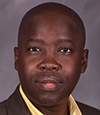 Babacar M’Baye is an associate professor of English and Pan-African studies at Kent State University. He received his doctorate degree in American Culture Studies at Bowling Green State University in 2002. M’Baye’s research interests are varied and include: the relationship between intellectuals of the black diaspora and those of continental Africa; African influences in African American, African Caribbean, African British and African Canadian literatures; black travel writings; black Atlantic theories and methods; and the representations of immigration, race, class, gender, and hybrid identities in black literatures, music, films, and cultures. M’Baye’s work has appeared in African and Black Diaspora: An International Journal; Journal of African Literature and Culture; New England Journal of History and other publications. He is the author of “The Trickster Comes West Pan-African Influence in Early Black Diasporan Narratives” (published by the University Press of Mississippi in 2009). His second book, “Black Cosmopolitanism and Anticolonialism: Pivotal Moments,” will be published in 2017 with Routledge.
Babacar M’Baye is an associate professor of English and Pan-African studies at Kent State University. He received his doctorate degree in American Culture Studies at Bowling Green State University in 2002. M’Baye’s research interests are varied and include: the relationship between intellectuals of the black diaspora and those of continental Africa; African influences in African American, African Caribbean, African British and African Canadian literatures; black travel writings; black Atlantic theories and methods; and the representations of immigration, race, class, gender, and hybrid identities in black literatures, music, films, and cultures. M’Baye’s work has appeared in African and Black Diaspora: An International Journal; Journal of African Literature and Culture; New England Journal of History and other publications. He is the author of “The Trickster Comes West Pan-African Influence in Early Black Diasporan Narratives” (published by the University Press of Mississippi in 2009). His second book, “Black Cosmopolitanism and Anticolonialism: Pivotal Moments,” will be published in 2017 with Routledge.
Rebeca Moreno, Washington College
FRIDAY at 9:30: “Movement, Transformation, and Relocation: Moirans’ disarticulation of African Slavery’s Legality”
 Rebeca Moreno, from Puerto Rico, received her Ph.D. in Spanish language and literatures from the University of Maryland, College Park in 2013. She has taught at the University of Maryland and American University, and currently is a visiting assistant professor at Washington College in Chestertown, Maryland. In the summers, she is also a Spanish School faculty member at Middlebury College, VT. Her areas of interest include Hispanic Caribbean literature, law and literature, Afro-Latin American studies and Colonial Latin America. She is the author of “Escritura, derecho y esclavitud: Francisco José de Jaca ante el nomos colonial”; winner of the 2016 Legal Work of the Year Award given by the Bar Association of Puerto Rico.
Rebeca Moreno, from Puerto Rico, received her Ph.D. in Spanish language and literatures from the University of Maryland, College Park in 2013. She has taught at the University of Maryland and American University, and currently is a visiting assistant professor at Washington College in Chestertown, Maryland. In the summers, she is also a Spanish School faculty member at Middlebury College, VT. Her areas of interest include Hispanic Caribbean literature, law and literature, Afro-Latin American studies and Colonial Latin America. She is the author of “Escritura, derecho y esclavitud: Francisco José de Jaca ante el nomos colonial”; winner of the 2016 Legal Work of the Year Award given by the Bar Association of Puerto Rico.
Ifeoma Kiddoe Nwankwo, Vanderbilt University
SATURDAY at 10:45: Roundtable Discussant
 Ifeoma Kiddoe Nwankwo, Ph.D., is associate provost for strategic initiatives and partnerships and associate professor of English and American Studies at Vanderbilt University. She is also former director of the program in American Studies. Her work centers on intercultural and intergenerational relations, particularly as they surface in the literary texts, oral narratives, digital publications, and popular music of Afro-descendent people in the United States, Caribbean, and Latin America. Her publications include “Black Cosmopolitanism”; “African Routes, Caribbean Roots, Latino Lives” (Latin American and Caribbean Ethnic Studies journal issue); “Bilingualism, Blackness, and Belonging” (in Black Writing, Culture, and the State in Latin America edited by Jerome Branche); “Race and Representation in the Digital Humanities” (in African Diaspora in the Cultures of Latin America, the Caribbean, and the United States edited by Persephone Braham); “The Promises and Perils of U.S. African American Hemispherism” (in American Literary History, reprinted in Hemisphere and Nation, edited by Caroline Levander and Robert S. Levine); “Rhythms of the Afro-Atlantic World” (co-edited with Mamadou Diouf); and “Living the West Indian Dream” (in Archipelagic American Studies edited by Brian Roberts and Michelle Ann Stephens). She is founding director of the Voices from Our America and Wisdom of the Elders public scholarship projects.
Ifeoma Kiddoe Nwankwo, Ph.D., is associate provost for strategic initiatives and partnerships and associate professor of English and American Studies at Vanderbilt University. She is also former director of the program in American Studies. Her work centers on intercultural and intergenerational relations, particularly as they surface in the literary texts, oral narratives, digital publications, and popular music of Afro-descendent people in the United States, Caribbean, and Latin America. Her publications include “Black Cosmopolitanism”; “African Routes, Caribbean Roots, Latino Lives” (Latin American and Caribbean Ethnic Studies journal issue); “Bilingualism, Blackness, and Belonging” (in Black Writing, Culture, and the State in Latin America edited by Jerome Branche); “Race and Representation in the Digital Humanities” (in African Diaspora in the Cultures of Latin America, the Caribbean, and the United States edited by Persephone Braham); “The Promises and Perils of U.S. African American Hemispherism” (in American Literary History, reprinted in Hemisphere and Nation, edited by Caroline Levander and Robert S. Levine); “Rhythms of the Afro-Atlantic World” (co-edited with Mamadou Diouf); and “Living the West Indian Dream” (in Archipelagic American Studies edited by Brian Roberts and Michelle Ann Stephens). She is founding director of the Voices from Our America and Wisdom of the Elders public scholarship projects.
Carina Ray, Brandeis University
SATURDAY at 10:45: Roundtable Discussant
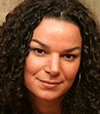 Carina Ray is an associate professor of African and Afro-American Studies at Brandeis University. A scholar of race and sexuality; comparative colonialisms and nationalisms; migration and maritime history; and the relationship between race, ethnicity, and political power, Ray’s research is primarily focused on Ghana and its diasporas. She is the author of “Crossing the Color Line: Race, Sex, and the Contested Politics of Colonialism in Ghana,” winner of the American Historical Association's 2016 Wesley-Logan Book Prize for African Diaspora History. Ray's new book project, a trilogy, engages questions of blackness, the body, race making, and identity transformation across the precolonial, colonial, and post-independence periods in Ghana.
Carina Ray is an associate professor of African and Afro-American Studies at Brandeis University. A scholar of race and sexuality; comparative colonialisms and nationalisms; migration and maritime history; and the relationship between race, ethnicity, and political power, Ray’s research is primarily focused on Ghana and its diasporas. She is the author of “Crossing the Color Line: Race, Sex, and the Contested Politics of Colonialism in Ghana,” winner of the American Historical Association's 2016 Wesley-Logan Book Prize for African Diaspora History. Ray's new book project, a trilogy, engages questions of blackness, the body, race making, and identity transformation across the precolonial, colonial, and post-independence periods in Ghana.
Serena J. Rivera, Bridgewater State University
FRIDAY at 11: “Between Feast and Famine: Food Lack and the Aesthetics of Cape Verdean Masculinity in the Works of Baltasar Lopes”
 Serena Rivera is visiting assistant professor at Bridgewater State University. She received her Ph.D. in Luso-Afro-Brazilian studies and theory from the University of Massachusetts Dartmouth in August 2017. Her dissertation discusses the intersections of food and masculinity during times of social change in Brazilian, Cape Verdean and Mozambican literary works and the role of these intersections in the construction of national identity in the Lusophone world. She has coordinated various cultural events to promote the language and cultures of the Portuguese-speaking world in partnership with the Center for Portuguese Studies and Culture at UMass Dartmouth, the New Bedford Whaling Museum and the Portuguese Consulate in New Bedford. In 2013, she received a Fulbright English Teaching Assistantship to Brazil where she taught language and culture to university students and high school teachers of English at the State University of Londrina. With regard to research, she is particularly interested in the connections between abject food tropes and issues of race and gender in Latin American and Lusophone African literatures and film as well as the politics of masculinity in Luso/Hispanophone cultural production.
Serena Rivera is visiting assistant professor at Bridgewater State University. She received her Ph.D. in Luso-Afro-Brazilian studies and theory from the University of Massachusetts Dartmouth in August 2017. Her dissertation discusses the intersections of food and masculinity during times of social change in Brazilian, Cape Verdean and Mozambican literary works and the role of these intersections in the construction of national identity in the Lusophone world. She has coordinated various cultural events to promote the language and cultures of the Portuguese-speaking world in partnership with the Center for Portuguese Studies and Culture at UMass Dartmouth, the New Bedford Whaling Museum and the Portuguese Consulate in New Bedford. In 2013, she received a Fulbright English Teaching Assistantship to Brazil where she taught language and culture to university students and high school teachers of English at the State University of Londrina. With regard to research, she is particularly interested in the connections between abject food tropes and issues of race and gender in Latin American and Lusophone African literatures and film as well as the politics of masculinity in Luso/Hispanophone cultural production.
Silvio Torres-Saillant, Syracuse University
THURSDAY at 4:30: Opening Keynote "The Advent of Blackness and Its African Consequences"
 Silvio Torres-Saillant is professor of English and Dean’s Professor of the Humanities at Syracuse University, where he has held the posts of William P. Tolley Distinguished Teaching Professor in the Humanities, chair of the Humanities Council, director of the Latino-Latin American Studies Program, and co-founder of La Casita Cultural Center. He came to Syracuse from the English faculty of Hostos Community College, having served as founding director of the CUNY Dominican Studies Institute at City College. A prolific scholar and social commentator, Torres-Saillant works on Caribbean literature, comparative poetics, ethnic American literature, Latino texts, diasporas and migration studies, intellectual histories, and the place of race as a factor of modernity stemming from the colonial transaction led by the Christian West. The author of influential analyses of Santo Domingo as “the cradle of blackness in the Americas” and of the Caribbean as a center of the world that the colonial transaction created, he has penned numerous publications. These include “The Advent of Blackness” (forthcoming); “An Intellectual History of the Caribbean” (2006); “Caribbean Poetics: Toward an Aesthetic of West Indian Literature” (1997; 2nd ed. 2013); “El tigueraje intelectual” (2002; 2nd ed. 2011); “An Introduction to Dominican Blackness” (1999; 2nd ed. 2010); and “El retorno de las yolas: Ensayos sobre diaspora, democracia y dominicanidad” (1999). He is co-author of “The Dominican-Americans” (1998) with sociologist Ramona Hernandez and of “The Once and Future Muse: The Poetry and Poetics of Rhina P. Espaillat” (forthcoming) with literary scholar Nancy Kang. He serves as associate editor of the Palgrave journal Latino Studies and was one of the senior editors of The Oxford Encyclopedia of Latinos and Latinas in the United States. He is recipient of the LASA Latino Section’s 2016 Frank Bonilla Public Intellectual Award.
Silvio Torres-Saillant is professor of English and Dean’s Professor of the Humanities at Syracuse University, where he has held the posts of William P. Tolley Distinguished Teaching Professor in the Humanities, chair of the Humanities Council, director of the Latino-Latin American Studies Program, and co-founder of La Casita Cultural Center. He came to Syracuse from the English faculty of Hostos Community College, having served as founding director of the CUNY Dominican Studies Institute at City College. A prolific scholar and social commentator, Torres-Saillant works on Caribbean literature, comparative poetics, ethnic American literature, Latino texts, diasporas and migration studies, intellectual histories, and the place of race as a factor of modernity stemming from the colonial transaction led by the Christian West. The author of influential analyses of Santo Domingo as “the cradle of blackness in the Americas” and of the Caribbean as a center of the world that the colonial transaction created, he has penned numerous publications. These include “The Advent of Blackness” (forthcoming); “An Intellectual History of the Caribbean” (2006); “Caribbean Poetics: Toward an Aesthetic of West Indian Literature” (1997; 2nd ed. 2013); “El tigueraje intelectual” (2002; 2nd ed. 2011); “An Introduction to Dominican Blackness” (1999; 2nd ed. 2010); and “El retorno de las yolas: Ensayos sobre diaspora, democracia y dominicanidad” (1999). He is co-author of “The Dominican-Americans” (1998) with sociologist Ramona Hernandez and of “The Once and Future Muse: The Poetry and Poetics of Rhina P. Espaillat” (forthcoming) with literary scholar Nancy Kang. He serves as associate editor of the Palgrave journal Latino Studies and was one of the senior editors of The Oxford Encyclopedia of Latinos and Latinas in the United States. He is recipient of the LASA Latino Section’s 2016 Frank Bonilla Public Intellectual Award.
Ben Twagira, Emory University
SATURDAY at 9: “Urban Men, Militarization, and the Afropolitan in Post-Colonial Kampala, Uganda”
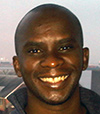 Benjamin Twagira is currently a post-doctoral fellow at Emory University, where he is affiliated with the Institute of African Studies (IAS) and the Department of History. He is a historian of Africa with research interests in Africa’s social, urban, military, and gender histories. His dissertation (defended 2017) explores urban militarization and social resilience in Kampala, the capital city of Uganda. A portion of this work appeared in Gender & History in 2016.
Benjamin Twagira is currently a post-doctoral fellow at Emory University, where he is affiliated with the Institute of African Studies (IAS) and the Department of History. He is a historian of Africa with research interests in Africa’s social, urban, military, and gender histories. His dissertation (defended 2017) explores urban militarization and social resilience in Kampala, the capital city of Uganda. A portion of this work appeared in Gender & History in 2016.
Robert Trent Vinson, College of William and Mary
FRIDAY at 4:30: Second Keynote "Rethinking Afropolitan Masculinities in the Anti-Apartheid Politics of Albert Luthuli and Martin Luther King, Jr."
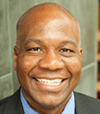 Robert Trent Vinson is the Frances L. and Edwin L. Cummings Associate Professor of History and Africana Studies at the College of William and Mary. He received his Ph.D. in African History from Howard University. Vinson has written “The Americans are Coming!: The Dream of African American Liberation in Segregationist South Africa” (Ohio University Press, 2012). His next book, “Chief!:The Anti-Apartheid Politics of Albert Luthuli, Africa’s First Nobel Peace Prize Winner” (Athens, Ohio University Press), is scheduled for publication in 2018. Vinson is also the co-author of two additional books in preparation, “Shaka’s Progeny: Zulu Peoples and Cultures in the United States and South Africa,” co-authored with Benedict Carton and “Crossing the Water: African Americans and South Africa, 1890-1965,” a documentary history co-edited with Robert Edgar and David Anthony (forthcoming, Ohio University Press). Vinson has also published several book chapters and articles and reviews, including in the American Historical Review, the Journal of African History, the African Studies Review, and the Journal of Southern African Studies. Named a Professor of Teaching Excellence at William and Mary, Vinson’s courses seek to explore African pasts in global contexts, internationalize African-American history and center Africa and Africans in African Diaspora Studies. Vinson is on the editorial board of Safundi: The Journal of South African and American Studies and the Ruth Simms Hamilton African Diaspora series and the African History and Culture series at Michigan State University Press.
Robert Trent Vinson is the Frances L. and Edwin L. Cummings Associate Professor of History and Africana Studies at the College of William and Mary. He received his Ph.D. in African History from Howard University. Vinson has written “The Americans are Coming!: The Dream of African American Liberation in Segregationist South Africa” (Ohio University Press, 2012). His next book, “Chief!:The Anti-Apartheid Politics of Albert Luthuli, Africa’s First Nobel Peace Prize Winner” (Athens, Ohio University Press), is scheduled for publication in 2018. Vinson is also the co-author of two additional books in preparation, “Shaka’s Progeny: Zulu Peoples and Cultures in the United States and South Africa,” co-authored with Benedict Carton and “Crossing the Water: African Americans and South Africa, 1890-1965,” a documentary history co-edited with Robert Edgar and David Anthony (forthcoming, Ohio University Press). Vinson has also published several book chapters and articles and reviews, including in the American Historical Review, the Journal of African History, the African Studies Review, and the Journal of Southern African Studies. Named a Professor of Teaching Excellence at William and Mary, Vinson’s courses seek to explore African pasts in global contexts, internationalize African-American history and center Africa and Africans in African Diaspora Studies. Vinson is on the editorial board of Safundi: The Journal of South African and American Studies and the Ruth Simms Hamilton African Diaspora series and the African History and Culture series at Michigan State University Press.
James Yeku, University of Saskatchewan
FRIDAY at 1:30: “Afropolitan Antiheroes and the Racial Politics of Online Scam Baiting”
 James Yeku is rounding off a Ph.D. at the University of Saskatchewan where he is completing his dissertation in the Department of English. He holds an M.A. in Performance Studies from the Institute of African Studies, Ibadan and a B.A. in English from the University of Ibadan. Yeku has published on African cultural studies, focusing on scholarly explorations of the cultural practices of everyday people articulated through digital media. His dissertation focuses on politics and performative agency in Nigerian social media and generates new perspectives on how online popular culture and images can be productive for the social media expression of resistance.
James Yeku is rounding off a Ph.D. at the University of Saskatchewan where he is completing his dissertation in the Department of English. He holds an M.A. in Performance Studies from the Institute of African Studies, Ibadan and a B.A. in English from the University of Ibadan. Yeku has published on African cultural studies, focusing on scholarly explorations of the cultural practices of everyday people articulated through digital media. His dissertation focuses on politics and performative agency in Nigerian social media and generates new perspectives on how online popular culture and images can be productive for the social media expression of resistance.

